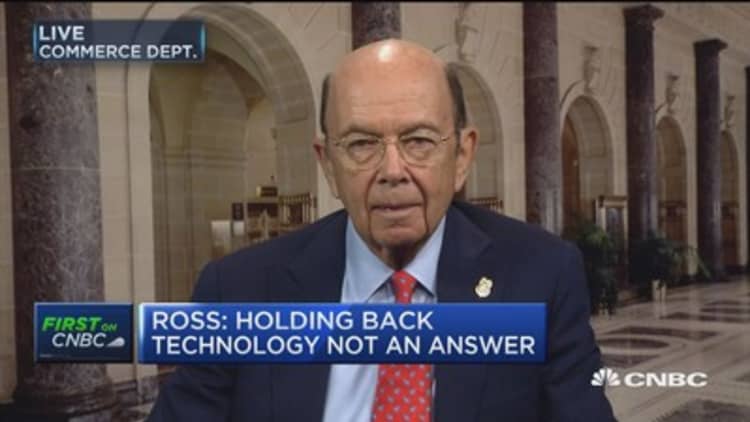
Unlike fellow billionaire Bill Gates, Commerce Secretary Wilbur Ross doesn't see a tax as a solution to the threat of job automation.
"I'm not in favor of trying to hold back technological advance," Ross told CNBC's "Squawk Alley" on Tuesday. "We need technological advance. And if we don't employ robots, the Chinese will, the Vietnamese will, the Europeans will, the Japanese will. Everyone will."
Ross was asked about the idea that income generated by robots should be taxed at similar levels to human income tax — a suggestion Microsoft co-founder Gates made in an interview with Quartz last month.
As a member of the new Republican administration, Ross told CNBC that regulation was not the way to jumpstart America's aspirations to bring back manufacturing jobs. Ross called overregulation the "single most important thing that bars" effective business decisions.
"The right solution is to properly equip the American workforce, not to try to hold back technology," Ross said.
Ross, who made much of his estimated $2.5 billion fortune by buying distressed businesses, suggested that improvements to the community college system might be one way to equip young people and the middle-aged people "to be part of the workforce of the future." More taxes, on the other hand, might handicap American business, he said.
Despite the shift of power in Washington, Ross' comments came amid bipartisan efforts to retrain U.S. workers. In December, President Barack Obama's administration released a report on artificial intelligence noting that U.S. workers displaced from their jobs have seen substantial and lasting declines in earnings.
Before taking office, President Donald Trump said he talked to Gates about the issue of automation.
"Right now we don't make the robots," Trump told The New York Times of his conversation with Gates. "We don't make anything. But we're going to, I mean, look, robotics is becoming very big and we're going to do that. We're going to have more factories."
Ross said he would leave it to technology companies to determine the economic benefits of innovations such as space travel. But that doesn't mean he has gone easy on the tech industry.
Ross leveled a hefty punishment against a Chinese smartphone company on Tuesday, saying he was "putting the world on notice."
ZTE agreed to plead guilty and pay about $900 million to the United States to settle allegations that it violated American laws on selling U.S. technology to Iran in violation of U.S. sanctions. It has agreed to pay another $300 million, suspended during a seven-year period, if it does not hold up its part of the agreement.
"Industrial power is, at the end of the day, a national security issue," Ross said.
— CNBC's Jacob Pramuk contributed to this report.


